Littledrum
I grew up in an Industrial town called Widnes on the outskirts of Liverpool and witnessed the Merseyside boom that produced The Beatles but wasn't old enough to take part. The Merseybeat era also produced The Blackwells, in which my brother, Roy Little, was the Drummer. Their trade mark was long platinum blonde hair and they played regularly in The Cavern Club and toured Germany. The Blackwells appear in the fil Ferry 'Cross The Mersey, playing their EMI single "Why Don't You Love Me". Roy's first band was called The Ravens and it was at a Ravens rehearsal that I got a chance to play on a real drum set for the first time when I was aged 8 or 9. I remember how easy it felt. Roy shouted over 'That's not bad Phil' and I thought maybe I could do this ! From that moment on all I wanted was my own drum kit.
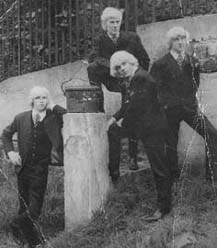
But I had to wait till 1965 before I could buy my own kit with saved up ocket money, which I earned peeling potatoes for my parents Fish and Chip Shop. In 1963 The Beatles had actually played in Widnes at The Queen's Hall. There was no way I could have got hold of one of the 800 tickets, which sold out in hours. I also missed out when Roy's new band, The Blackwells, played their sell out gig at The Columbia Hall. My mother had taken me along all smarted up and the doorman wouldn't let me in because it was a licensed club and sold alcohol. It was also full of screaming girls. It wasn't only The Beatles that caused the mass hysteria on Merseyside.
When I was 12 the brother of someone at school had a yellow Gigster kit for sale so I snapped it up for £10 and that was my start. Two boys in the same class had guitars and we started rehearsing Jimi Hendrix, The Who and Cream songs in the Cafe behind the Fish and Chip Shop. There were some lads a year or two older than us called Mike Bersin and John 'Tup' Taylor. In 1968 I used to go and see their band Colour all over the North including several gigs at Penketh and Sankey Youth Club. By 1969 they had moved on and formed a band called Ibex, then Wreckage, in London with Freddie Mercury. Meanwhile, Compound had their own gig at Penketh Youth Club where we had seen Colour perform so many times.
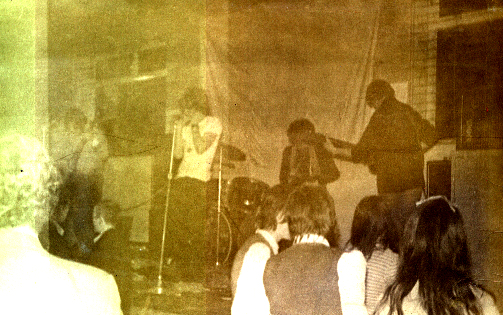
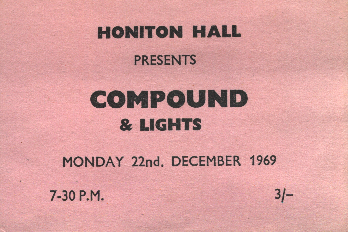
I can remember doing a drum solo and playing all round the kit on the stands and knee on the floor tom etc. and I got a huge round of applause which gave me a bit of a taste for that kind of thing. The above photo features Phil on Drums, Ralph Crawford on Bass, John Dando on Guitar and according to an old school friend, Eric Oultram, it is Al Moore singing in the photograph.
My friends were true connoisseurs of Progressive Music and we would go anywhere to see a particular band. In 1969 we attended the Bath Festival and The Plumpton Festival, and in 1970 the huge Bath Festival with loads of American stars. Hit the links for the excellent webpages on the Festivals.
After I left school I did some rehearsing and gigs with guitarist John Dando. He introduced me to a great singer and harp player called Mike Wheeler. Temporarily named MBQ (Modern Blues Quartet), we played at a music festival in Warrington on the same bill as Marty Wilde. Also, at some bikers all nighter on Southport Sands. These would be in 1969.
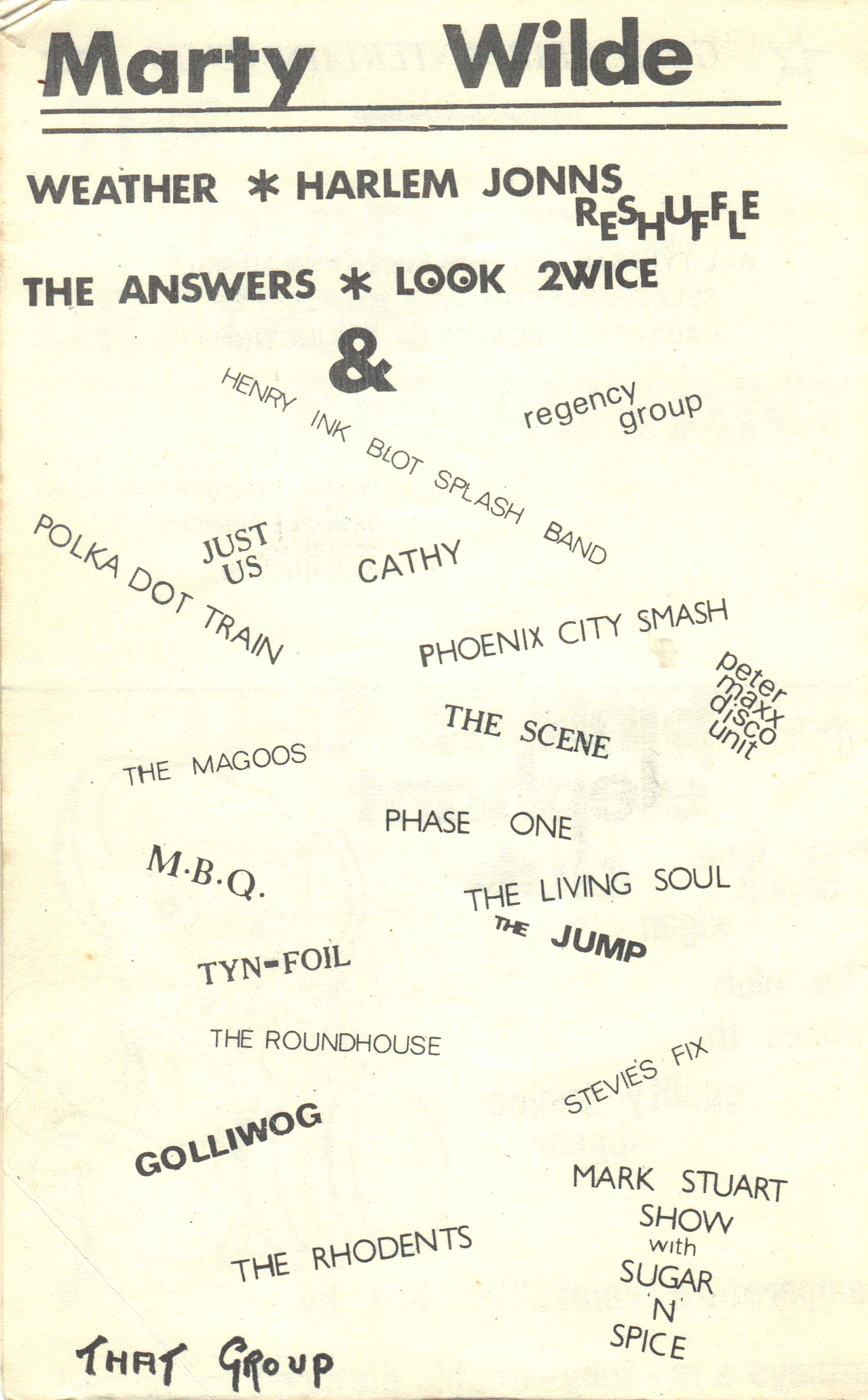
I wanted to do more gigs and get in a good band. The other guys in my school band stayed on to do A levels but all I wanted to do was play the drums. That meant joining a band in Liverpool and after leaving school I replied to an advert for a drummer in the Liverpool Echo. The band was called Bells and my Dad drove me to a big Church Hall in Speke for my audition. I think that was the only time he heard me play with a band. He used to say "Why don't you get a proper job ?".
I managed to get that job and they had an agent and gigs every week so I was on top of the world. Bells used to play often at The Babalou Club, The Temple Club, The Blue Angel, The Gauntlet, and at The Cavern Club in the original cellar in Matthew Street. We seemed to go down extremely well at Kendal Rugby Club who booked us back for Christmas Eve 1969. A nice drive from Liverpool. We also played all over the North West and in rural locations like Blaneau Ffestinniog in North Wales."

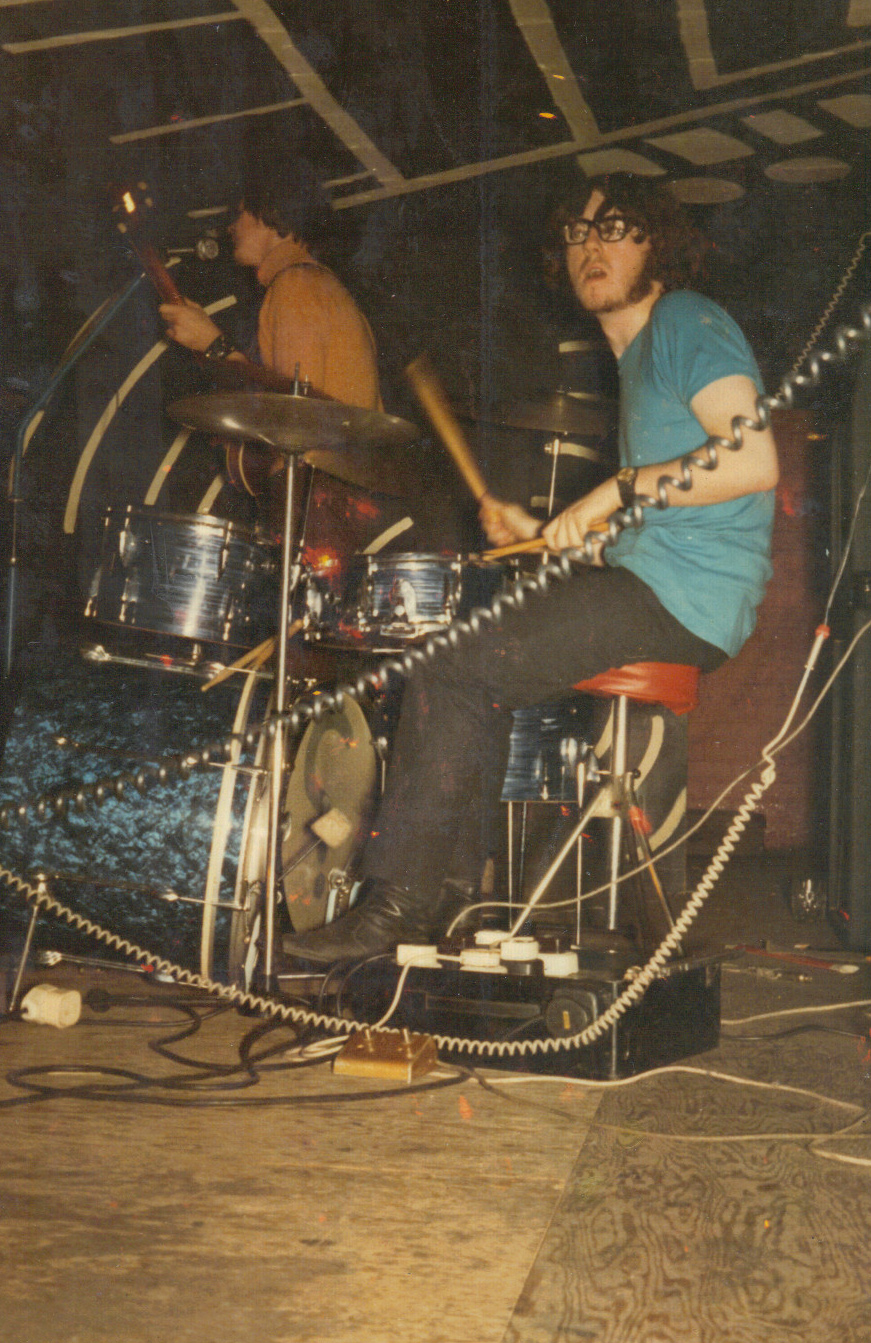
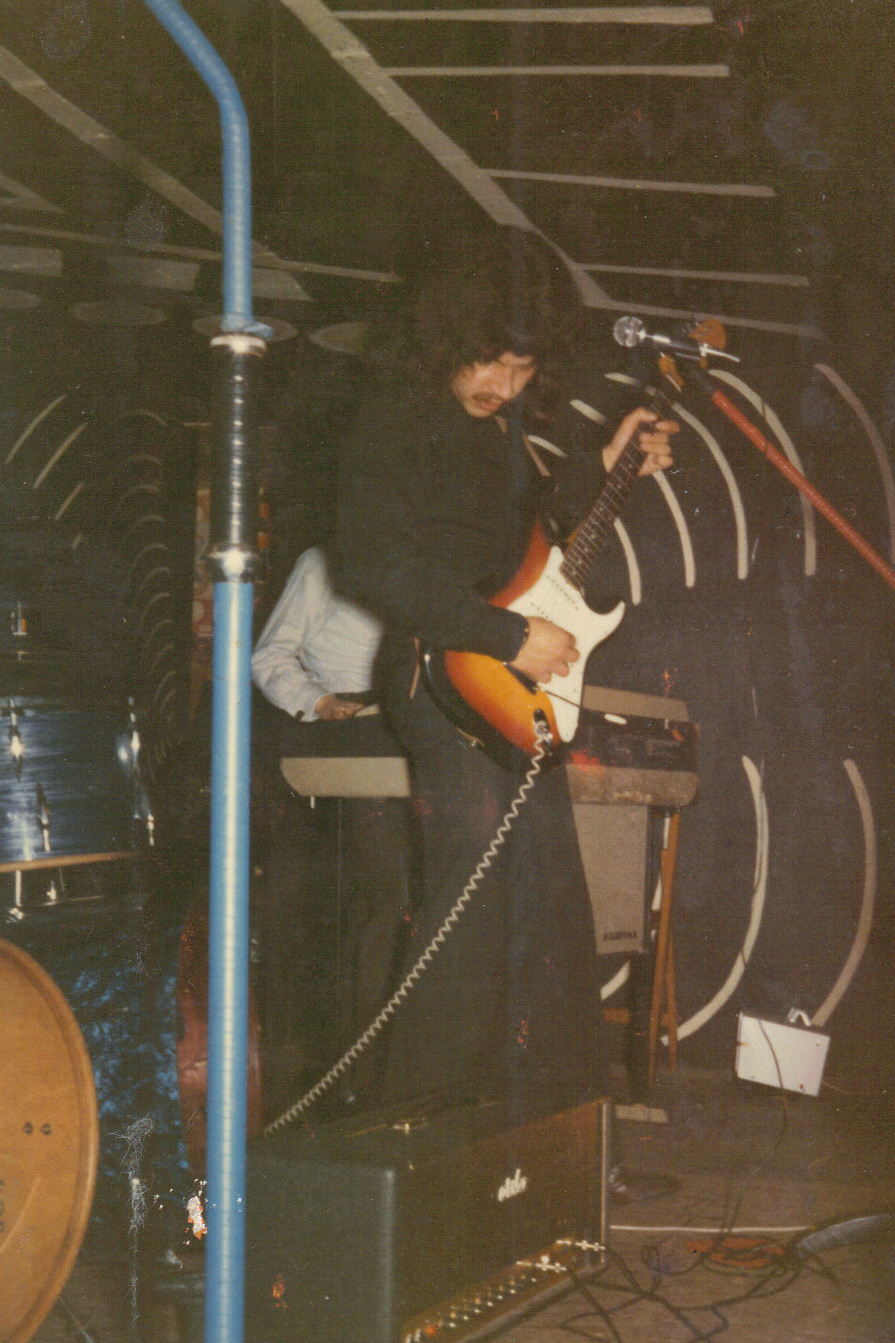
Pete Golbourne and Phil Little (left photo) - Maurice Banks (right photo)
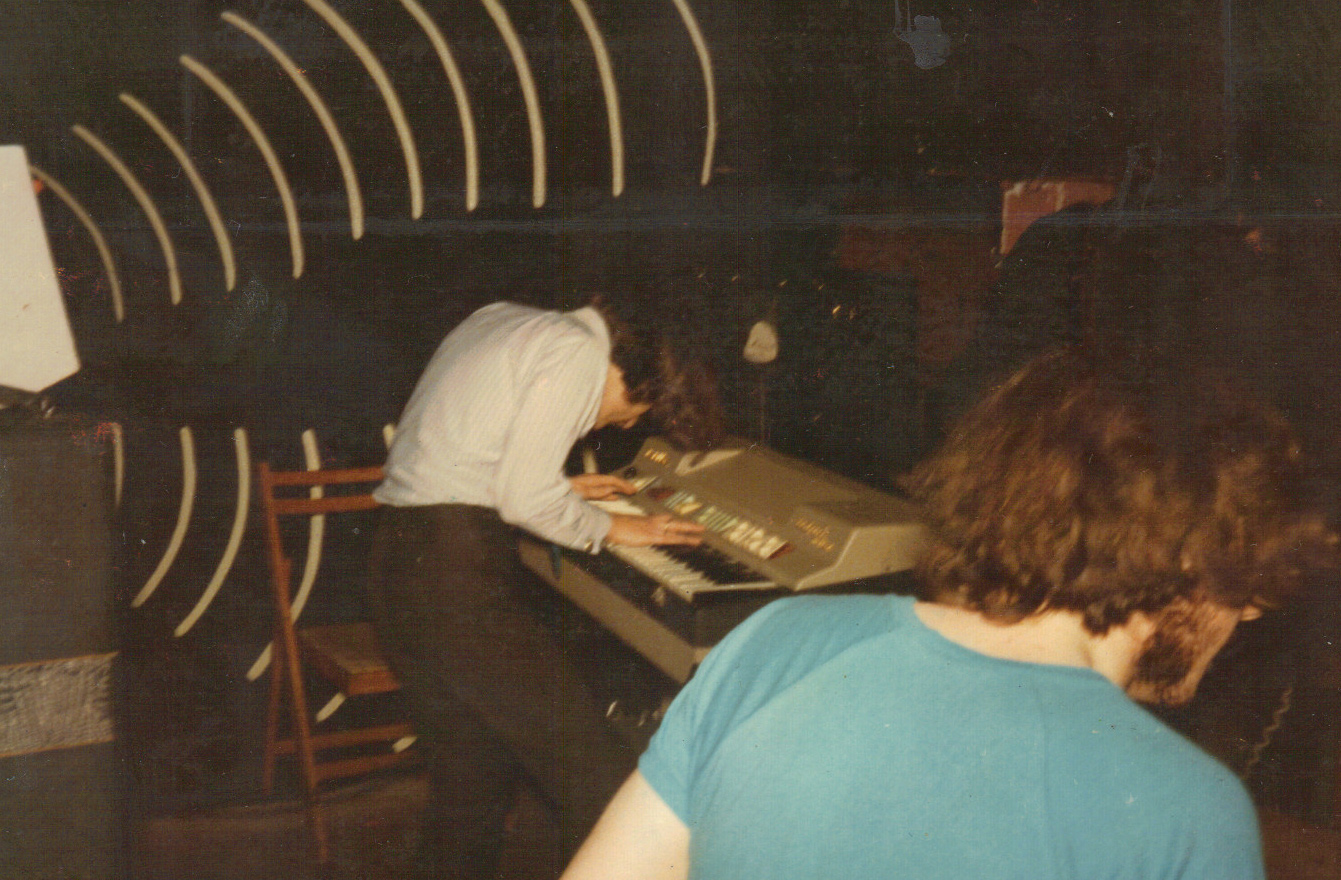
Tommy on Farfisa Organ
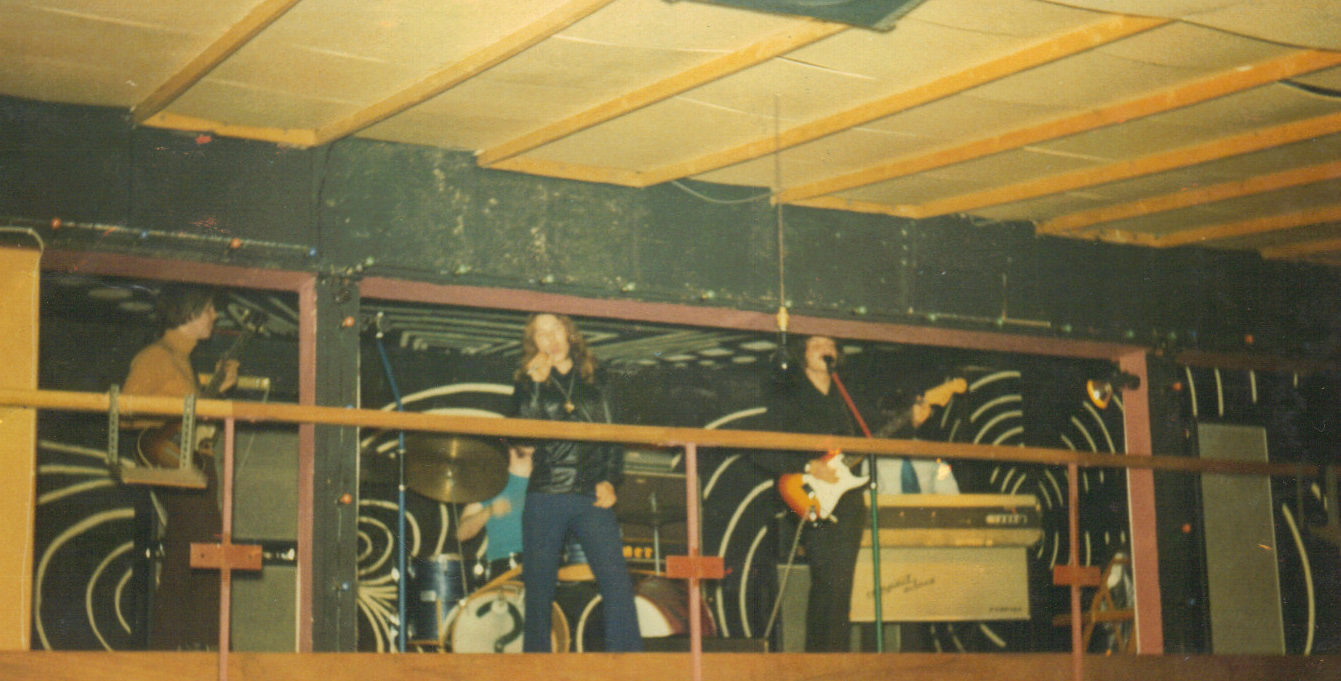
Bells with Frank (White Witch) sitting in on Vocals
Pictures from The Babalou Club - Liverpool
The front man was Maurice Banks on Lead Guitar and Vocals, Tommy on Organ and Pete Goulding on Bass. We played a popular mixture of Prog Rock Blues covers. Songs I can remember are, Hey Joe - Jimi Hendrix, Light My Fire - The Doors, Alright Now - Free, American Woman - Guess Who, Man Of The World - Fleetwood Mac, I Got Mine - The Small Faces.
In the summer of 1970 I left, but Bells reformed under the name Oblet for a special gig I organised starring Gentle Giant at The Queen's Hall Widnes in 1971 with four support acts. Oblet, Schunge, Alcestis and another.
Sometime during this period I formed a band in Widnes with Tony Kenna on Sax and Flute with Ian Perry from Wade Deacon School on Bass. We only did one gig at Wade Deacon Girls School which featured about ten of my mates onstage jamming on a version of Joe Cocker's The Letter. This was a few weeks after Freddie Mercury had played one of his first ever gigs at the same venue with Wreckage, but they wouldn't let me in to see the Wreckage gig because I had already left the Boys school. Anyhow we had a good night.
Early in 1971 Tony had moved to London where he joined a band called Alcestis. Alcestis had travelled up from London and played at the Gentle giant gig. On Christmas Eve 1971, I got a letter from Tony, who was now in Swansea, saying "Come down with your drums. Got a new band and they have a Transit van."
Well a Transit was everything back then, so, within the week, I had packed my job in and off I went. Of course when I got to Swansea it had all fallen through. A week later we were selling our worldly posessions to get the coach fare to London. We arrived in Tooting Bec, South West London, at 8am one Monday morning and a few days later managed to get bedsits in the same house as two other musicians from Widnes, Schunge and Rob Richardson.
Schunge and Rob had been in our crowd in Widnes and had moved to London in 1971. They had got a record deal with Red Bus who managed, among others, Geordie (Geordie's singer later joined AC/DC). We slept on their floor for a few days and 'too much for coincidencely' the room next to theirs came free. Tony and I took it and I stayed there for two and a half years. Tony soon got the room downstairs and his wife to be Jan joined him. We had moved to London and started a Little Widnes scene in Tooting Bec.
Schunge was finishing his album "Ballad Of A Simple Love" in a top West End studio and I popped up there a few times. I wasn't aware at the time but the guitar player on Schunge's sessions was Chris Spedding who is now legendary for the amount of stuff he has played on including the Sex Pistols album.
Red Bus were producing a band called Jericho and I had an audition with a couple of brothers from Israel who needed a drummer for their three piece. We didn't really gel but I recently discovered a webpage with a reference to their album "Jericho". I don't know who ended up drumming on it but I have an idea they used a studio session musician. They were also being produced by Ellis and Roberto the two Mediterranean headcases who ran Red Bus.
Back at base Tony Kenna and I searched for a band together but couldn't find anything in the Melody Maker that suited us both together. It was easy to get jobs in those days and I got a job in the laboratory of a paint factory. Within a few weeks Rob Richardson had moved my drums down from Swansea for me and I could see about getting in a band.
I applied for, and got the drumming job in a three piece band called Zeus, which was two brothers Tony Cowell on Lead Guitar and vocals, and Dave Cowell on Bass guitar and vocals. I seem to remember Dave had a plexi-glass Dan Electro which he bought in America. Zeus used to play a mixture of well known Blues Rock songs. I can remember Johnny B Goode, which Tony handled quite well at speed, and Hey Joe.
I remember, Zeus had a gig supporting Genesis and Barclay James Harvest at Watford Art College but I hadn't rehearsed with them so they got their old drummer to do it. He was a guy called Paul who had a monster Green Sparkle Double Bass Drum Slingerland kit, I had never seen anything like it. He bought it with the money he got for designing the cover of a Robin Trower album. Anyway I didn't play and was a bit sick about it but the place was full to the brim and it was a great gig to be at. Genesis were at their peak then in 1972. I sat behind the amp next to Phil Collins and was quite impressed. Odd time signatures, everything. At the end of Knife, Peter Gabriel threw a mike stand over his shoulder and I was extremely fortunate to survive the near miss. Amazingly, I found a live recording of Genesis performance at this gig on the internet.
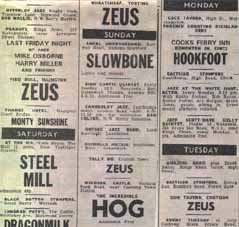 Before
long, Zeus
were playing two or three gigs a week, mostly in London and Surrey.
The
guitarist, Tony decided to augment the sound and my pal Tony Kenna
joined on Piano and Sax. We used to lug a full sized upright piano
around in the van to gigs. Madness. Later on, Dave Cowell, the bass player got a job
with Fusion Orchestra who had a deal and their own gigs at The
Marquee,
so that version of Zeus wound up.
Before
long, Zeus
were playing two or three gigs a week, mostly in London and Surrey.
The
guitarist, Tony decided to augment the sound and my pal Tony Kenna
joined on Piano and Sax. We used to lug a full sized upright piano
around in the van to gigs. Madness. Later on, Dave Cowell, the bass player got a job
with Fusion Orchestra who had a deal and their own gigs at The
Marquee,
so that version of Zeus wound up.
Tony and I put an advert in the Melody Maker. Nothing came of that but I met a Tenor Sax player called Lyle Jenkins who I got on real well with and who suggested he and I put a band together. He had played with The Keef Hartley Band whom he joined a month after they played at Woodstock. Keef Hartley had played with John Mayall on his seminal album, Blues From Laurel Canyon. Lyle recently told me that he was one of the last people to see Jimi Hendrix alive, since Keef's band were on before Jimi at the German Festival which was Jimi's last gig. By the time Lyle and The Keef Hartley band got back to England after playing another festival, Jimi had died.
Anyhow Lyle and his trumpet player friend, Dave Caswell, had also played with Ashton Gardner and Dyke who had toured the States and had a hit with Resurrection Shuffle. Lyle said if we could get the band together Dave would join us.
We used to rehearse in a cheap studio with a cheaper drum kit in Kings Cross. Lyle recruited a bass player called Dennis Cowan who said he had played with the Bonzo Dog Doo Dah band, and that he wrote songs.
Anyway I quit my job so I could rehearse in the day and Dennis got in a great little guitarist called Mick and we were rehearsing in a vicarage in Finsbury Park. They named the band 'Ramshackle'. Guitar, Bass, Drums and a three piece Brass section while the vicar was in the next room composing his sermons. If I remember correctly, Mick laid that on. Mick was from a traditional Irish family in Finsbury Park and they seemed to have connections in the area.
He asked me to play with his other band called Vagrant, who had loads of gigs in North London so I said yes, even though I was still living right at the other end of the Northern Line. We used to be the main band at The Cock in Kilburn High Road and played often at some enormous pub opposite Highbury tube. Vagrant had Lil on vocals and Steve on bass with Vic 'managing', but in later years, about 1982, I played one gig with them again and they had changed their name to The Helicopters. That was at the 101 club in Clapham which was all New Wave then.
Once at the beginning of 1973 we played at a college on the South Bank supporting The Pink Fairies who we shared a dressing room with. Lemmy from Hawkwind was there and we had a good natter in the dressing room, what a thoroughly nice guy he was.
The other band went into a four track studio with the brass section and cut a demo. Four track tape was quite serious then, if you were paying for it yourself. Lyle had scores for the brass parts and they brought in a trombone player. It all went quite well, but as so often happens, nothing came of it. We didn't have a singer and were just demoing songs.
I was disillusioned with that. Mick's band was gigging and I wanted to get a keyboard player in. So I left the outfit with Lyle and Dennis as it petered out and concentrated on the gigging band relying on the Northern Line to get me from one end of London to the other. They had a trailer and my drums were stored in that so all I had to do was turn up at the gig. Due to an extreme eye condition I have never been able to drive and that has been the biggest setback of my playing career. The amount of work and opportunities I have had to turn down or miss through not having enough vision to drive has been critical in my rise to obscurity. It's quicker on the Tube though.
Without detailing all the heartache, madness and ups and downs in my life during 1972, let's just say I was ready for a change.
In the spring of 1973 I found this in Budlipp Springer. A Blues Rock band based around South London. The Bass player, Vic Young, was from Liverpool and lived around the corner from me. They had a blistering guitarist, Bernie Brooks and a great singer with a voice like Paul Rodgers from Free. His name was Jim. They had a manager with a van called Ron Popham and we were able to roam North and South London. Their tradition was to get a KFC on the way home and once I ate some. This was more a band of lads. Old enough to be off the leash, serious drinking and so on. Like all the other bands so far we played It's Alright Now and a few Blues tunes. Dust My Broom, Witchdoctor. We used to finish with a long jam on I'm Going Home (Ten Years After) which could last anything up to half an hour. We played every Tuesday in a Youngs Pub in West Croydon Market. Saxist, Don Weller's Major Surgery used to play there every week as well. I thought and still think he is a fantastic player and his Major Surgery band played very modern improvisational Jazz. We also played at The Gun in Croydon a lot, but there used to be regular trouble there so we gave it a miss. Once we went in for a talent contest at a huge pub in Carshalton or somewhere (the manager's idea) and we played great and got easily the best reception, but they fiddled it and gave it to a Country band, set up job. I have always, if possible, avoided such enterprises since.

Budlipp Springer at The Dog and Bull , Croydon 1973 - photograph by Fraser Ashford
Budlipp Springer went into a studio once and we recorded three or four of Bernie's songs which we worked into the set, and a couple of standards, but I never got a copy of any of that. Even in 1973 you didn't have cassette players about to copy stuff. Can't remember what happened or half the places we played. Once we supported The Edgar Broughton Band at the Roundhouse in Dagenham and went down well. In later years Bernie was to have a hit in Belgium with a song called, "Come On Alice". I recorded and played with him often over the years afterwards but we didn't do many gigs. Vic Young had some success as a session guy for Stiff Records through the Punk era and then moved to Australia for twenty years. Then one day in 1999 he turned up at one of my percussion events in Hastings and came up and said "I bet you don't remember me!". I did as it happened.
At home Schunge was out of his deal with Red Bus and he and Rob were financing their own recordings. Every week they would have a four hour session in a Sixteen Track Studio. They used Majestic Studios in Clapham Common quite a lot and the Tooting Broadway Studios where the Glitter Band and Mud were based. Schunge had me play drums on several tracks of his third album Pluto. They used to take me down to the studio and invite me to express myself on tracks with varying tempos. I must re-examine the results sometime.
Vic left Budlipp and I followed. I was working at the Blood Transfusion depot in Tooting and doing a great deal of partying but I was musically frustrated and I was fed up of doing covers and the odd standard in pubs. So I didn't make much of an effort to find a band. There always seemed to be people in and out of my tiny flat and life was that fantastic non-stop excitement that you can maintain when you are twenty. My 21st was approaching and I decided to throw a party above The Wheatsheaf pub opposite Tooting Bec Tube. What a night. Anybody who was there still remembers it. A busload arrived from Widnes and all the Multi Racial mix of people who worked at the blood bank, plus all the local friends and contacts made it an amazing vibe. The place erupted when little Benny stripped down to his underpants and gyrated up against the huge mirror over the fireplace to the sound of Pink Floyds 'Money'. The little Irish landlord came running up to me shouting. "There's someone doing a strip, you'll have to clear out !" Somehow they all seemed to end up in my flat afterwards and I had to sleep on the floor.
At some high point during the evening Tony and Jan Kenna came up to me and he said, "Let's move to Swansea and form a band". I can remember I was sat on a grand piano at the time and it felt good so I said Yes.
I spent a year and a half based in Swansea and playing with South Wales 'Glitter' band Blue Eyes. Again they were playing It's Alright Now and by this time I was getting totally fed up with this number. To the point where, later on, I refused to play it for about ten years. We played in Swansea, Rhayader, Llandrindod Wells, Tenby, Saundersfoot and LLantrisant.
At the beginning of 1976 I moved back to London and got a job back at the Blood Transfusion centre in Tooting. Through the melody Maker I got in a band which called itself Second Sign. I got them a plug when I appeared on a Dave Cash quiz show on Capital Radio.
Second Sign were a strange band. Led by a South African guitarist called Andy, they had a wobbly French guitarist who was into meditation, and a talented guy called Rohan on bass. Later on Rohan brought his Hammond Organ down from up North and Dave Hughes from Widnes joined on Bass and led me astray Second Sing also got in a girl singer who had only a passable voice and worse still fell into a relationship with the wobbly French guitarist. A recipe for disaster if ever there was one. They used to rehearse in a house in Richmond and I used to leave the kit there and cycle the ten miles or so and back.
We did some recording at Surrey Sound Studios in Leatherhead. At the time Squeeze were recording their first album there and all their gear was set up including Gilson Lavis' black Ludwig Octaplus kit. Police also recorded their forst twop albums there, Outlandos d'Amour and Reggatta de Blanc.
Those recordings are linked below. At last, in 1976 cassette players were getting a bit more common so I managed to get a copy which has deterioated a bit now. Rohan's Hammond Organ was splendid and he had imagination too. We got a few more gigs but we were playing music that people were losing interest in. The music was imaginative, but a lot of folk had still not realised that the popularity of progressive rock music was over, following "The Punk Wars". Second Sign played once at the Two Brewers in Clapham but it was a bit over people's heads. I know it was way over mine. Rohan went to University in Aberdeen and the band folded.
Towards the end of my time in this band, The Organist, Rohan, asked me if I was interested in playing in a musical called Jacques Brel Is Alive and Well and Living In Paris at the Kingston Theatre for a month. This musical featured popular songs like Jackie and Ne Me Quitte Pas, that would later become chart hits for people like Scott Walker and Mark Almond. There were about twenty-five songs in the show and they covered a whole range of styles. Looking back it was quite demanding but I was able to attend rehearsals for a week before so it wasn't that much of a stretch.
Rohan's friend Judy was the musical director and he was going to play bass in the seven piece band but they were short of a drummer. I had never done anything like this before but I gave it a go and it was a most interesting experience to glimpse into the world of theatre. This photograph taken during a performance has myself and Rohan in the background on the left.
Next out of the Melody Maker was Beaver who had had a single out on Rockburgh Records. They had to get a new drummer. The auditions were in Balham and I got there way early as I was so keen. I sat outside and could hear what the drummer in there was doing and got and idea of the arrangements of the songs they were trying out. That helped me no end and they were impressed. They told me that Reg Isadore had auditioned as well, a few days earlier. I had been right into Robin Trower's first three albums and I loved Reg's drumming. I went off Robin Trower after Reg left. He was a very physical drummer and he was tight and had the feel. I was elated to get this job and I think a lot of it was to do with getting along well with the bass player Mick Phillips. They had a great singer, an american bloke from Portland, Oregon, Dave Morrison. The guitarist Nick Branwell was well on top of it too, a good all round guitarist.
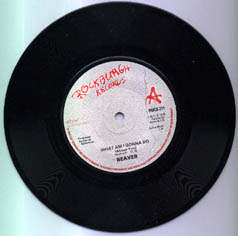 We
played a lot in The
Kensington and a pub called The Great North Western in Paddington. We
recorded their second single, "What Am I Going To Do About You"
(Rockburgh ROCS 211 ), in Regent Sound Studios and it was mixed at
Park
Lane Studios. t. The record got played by Andy Peebles once on Radio 1
and the producer, who owned the record company, buried it and gave us
250 copies each. I think it was a calculated tax loss. Some months
later he persuaded the singer to go solo. Never heard his name again.
I
bumped into the bass player Mick Phillips in 1987, when I was with the
Flying Pigs playing at a tribute to South London pub landlord, Tommy
Hoolahan. Mick was playing at the same gig with The Mick Clarke Band.
We
played a lot in The
Kensington and a pub called The Great North Western in Paddington. We
recorded their second single, "What Am I Going To Do About You"
(Rockburgh ROCS 211 ), in Regent Sound Studios and it was mixed at
Park
Lane Studios. t. The record got played by Andy Peebles once on Radio 1
and the producer, who owned the record company, buried it and gave us
250 copies each. I think it was a calculated tax loss. Some months
later he persuaded the singer to go solo. Never heard his name again.
I
bumped into the bass player Mick Phillips in 1987, when I was with the
Flying Pigs playing at a tribute to South London pub landlord, Tommy
Hoolahan. Mick was playing at the same gig with The Mick Clarke Band.
During 1977 - 1978 a socialist political movement called Rock Against Racism had been growing and me new band out of the Melody Maker, Red Rinse, were well into all that. The singer often spoke of his experiences at the Lewisham riots. Red Rinse described themselves as a "feminist" band and played all original material at Anti Nazi League and RAR gigs at colleges in places like Stoke and Sheffield as well London pubs, colleges and warehouses on the Thames.
Jim Woodward on vocals Stuart guitar and my good friend no longer with us Bob Sapsed on bass. We were aslo joined by my insane Scots friend Danny Rochead as manager. He had energy though and soon we had gigs, badges and T shirts. He got some strange gigs too. One time within 24 hours he had us playing at a pub in Kensington, a Handicapped day in Hyde Park and a Greek wedding in the afternoon where we got paid off. No surprise as they played mostly self penned numbers with titles like "Mast*rbation" and "Sisterhood". They also played a song called Nasty by Kevin Coyne who was brilliant. We did an interesting gig at The Canterbury in Brixton supporting him. On another occasion we played at a big RAR gig at Wandsworth Town Hall supporting reggae band Misty. Ian Dury was there and was polite enough to go and sit out front and listen while we played. What a beautiful man. Respect !
One of the most memorable gigs of my life was with Red Rinse on the back of a lorry. We played for about four hours in a Rock Against Racism Carnival procession from Clapham to Brockwell Park where The Clash headlined the main gig. The procession moved slowly and our lorry was flanked by eight Policemen. By the time we had passed through Clapham, Stockwell and Brixton the streets were thronged with tens of thousands of people. In one particularly exciting bit we were going down the front line and people were hanging out of the windows and cheering as if in one of those American ticker tape parties. Thousands of people crammed into the narrow street and the whole place was going crazy. It was fantastic. I will never forget, at the end of one song, even the Superintendent Police chappie who was marching beside the lorry threw up his arms in applause, cheering, as if he had lost control of his demeanour.
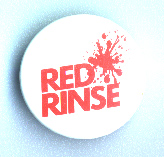
Red Rinse had signed an awful deal and the only recordings they made they had to organise and pay for themselves, so I wasn't getting any money for playing and I had to withdraw.
The years between 1977 and 1984 are the only years I have ever had anywhere decent to practice. There was a cellar under the flat I shared with my girl friend and it began to come in real handy as you could almost fit a band in there.
In 1979, Widnes ex-pat, Dave Hughes, asked me to join a band called Kleen Heels that he was in. As well as Dave on bass there was Phil Ford, who wrote most of the songs, sang and played Lead Guitar and Mark Mallery on Rhythm guitar. We were able to rehearse in my cellar and get tight on some excellent songs Phil had written. I have some good cassette tapes of gigs by this band (see Real Audio links further on). Pretty soon the band became really popular around the Brixton and Stockwell area and our gigs in The Two Brewers and the Old Queen's Head were packed out. It was at one of these that ex- Alvin Lee bass player, Mick Hawksworth, first saw me playing.
Phil Ford was very talented. They were all into The Hitch Hikers Guide which was then just a Radio programme being broadcast on BBC Radio 4. They taped it and played it in the break one night. It was just like the old hippy gigs of the sixties. Everyone sat on the floor and listening. At the end of the first episode the earth is blown up and the audio is a great big rumble. They had that going through the PA and we came in with the first tune, "Overture", over that. It just worked so perfectly it was very effective and this was another really memorable gig.
Phil Ford, Dave and Mark all wangled themselves park keepers jobs for Wandsworth Borough Council and used to spend most of the days practising in their cabin, so they ended up very tight on the original songs that Phil Ford had written, and that everybody contributed riffs and arrangements to. The songs still stand up as songs today and the music was pretty fair.
Kleen Heels built up a strong following in South London but it was still new wave bands that were getting all the record deal action and this band was progressive blues rock. We played in the Rock Garden in Covent Garden a few times and had one very good night there. That particular venue was a bit of a carve up though and you only got paid for the people that you brought with you, although it was in the centre of London.
Phil Ford's songs were so good that I included several live recordings here. All were taken from a gig at The Old Queens Head in Brixton on 3rd April 1979.
MP3s
Overture Kleen Heels
I Can't Tell You What To do With Your Life Kleen Heels
Police State Kleen Heels
Spots/ Devil In The Mirror Kleen Heels
Around this time , Mick Hawksorth saw me playing at the Old Queens Head and when he heard that I had left Kleen Heels, he approached me about forming a new band with him. He had a few songs that he wanted to do and wasn't bothered about starting off from scratch. He reckoned he could fit my drums and his enormous Acoustic 360 bass stack in his Cortina Estate so that solved my transport problems.
Mick had played with Alvin Lee, Andromeda and a group called Fuzzy Duck. I had never heard of Fuzzy Duck but they now appear to be a bit of a cult band with copies of their album worth a bucket of money.
We held some unproductive auditions although it nearly clicked with a local guy called Mike King and an ex-Manfred Mann's Earth Band guitarist, Dave Flett. They were both funny guys and good players but Mike King was hilarious, a complete nutter. I remember the climax ending of one song we played and on the last big chord he swung the arm of the guitar up. He was a and the top E machine-head was missing. Hawksworth and myself fell about laughing and were unable to continue playing.
Then Mick Hawksworth suggested phoning ex Man guitarist Mickey Jones who had been playing in London pubs with his own three-piece called Manipulator. Mickey came down to the pokey eight-track studio just up the road from Mick’s flat in East Dulwich and the three of us clicked instantly. We started rehearsing in my cellar and within a couple of weeks we were playing in a few different pubs in South London. Sometimes Steve Waller (another ex-Manfred Mann guitarist with the voice of a Righteous Brother) would join us and the pub would be packed to see Waller and Mickey Jones playing together. Two fabulous singers, both lead guitarists with major original progressive bands of the seventies.
Very early on we recorded two or three tracks at the small studio near
to Mick’s house but we were keen to get into a quality Studio and see
what we could do. Somebody knew Pete Carr who had produced The Motors’
“Airport” hit single. He had expressed an interest in producing us and
Mick had inveigled a day in Alvin Lee’s private studio on his farm in
Buckinghamshire. We put down the backings for five or six tracks and
Mick Hawksworth and I went to the pub with Alvin’s roadies. When we
returned a bit pissed later Alvin had put an intro and Lead Guitar
solo
on one of Mick’s tracks, “Private Movie”. Mickey said, “He came in and
I didn’t have any ideas what to do on the track so I asked him if he
fancied playing the lead guitar and he plugged in and played it.”

The story goes that Pete Carr took the finished tapes to the States
and
almost had a deal with a major record company there, when, at the last
minute, some sequence of events conspired to dash the plans.
These times were difficult for Rock and Blues bands on the London Pub
circuit. Punk had really established itself and many venues were
switching to New Wave music.
The Flying Pigs played a few Tuesdays at a big pub in Clapham Common
called The Two Brewers. We were pulling a crowd and within a year we
were a regular Saturday night band at The Brewers. That was until the
pub closed down to become a gay club.
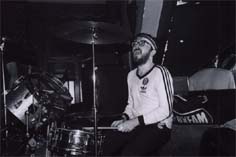 Although all the big pubs were
going New Wave, Mick Hawksworth knew his way around and there was
always two or three gigs a week in the smaller pubs which would still
be full because a lot of people always showed anywhere Mickey played.
Also, a lot of the other musicians in South London would come to
Flying
Pigs gigs and jam sessions were the norm with musicians like Steve
Waller, Steve Smith and Brendan Hoban joining in. For a while Mick
Hawksworth ran a Tuesday night Jam at The Mitre in Greenwich under the
name Corporal Henshaws, among other things,and both Mickey and myself
played in that at various times.
Although all the big pubs were
going New Wave, Mick Hawksworth knew his way around and there was
always two or three gigs a week in the smaller pubs which would still
be full because a lot of people always showed anywhere Mickey played.
Also, a lot of the other musicians in South London would come to
Flying
Pigs gigs and jam sessions were the norm with musicians like Steve
Waller, Steve Smith and Brendan Hoban joining in. For a while Mick
Hawksworth ran a Tuesday night Jam at The Mitre in Greenwich under the
name Corporal Henshaws, among other things,and both Mickey and myself
played in that at various times.
I suppose the biggest gig we did was The Stonehenge Festival in 1983
or
1984, to about 11,000 people. Unfortunately it ended in disappointment
when the guy who introduced us walked off the stage dragging Mickey
Jones' Echoplex unit with him. Certain delay effects were built into
our sound and routine and it just didn’t sound as it should after the
effects unit was wrecked.
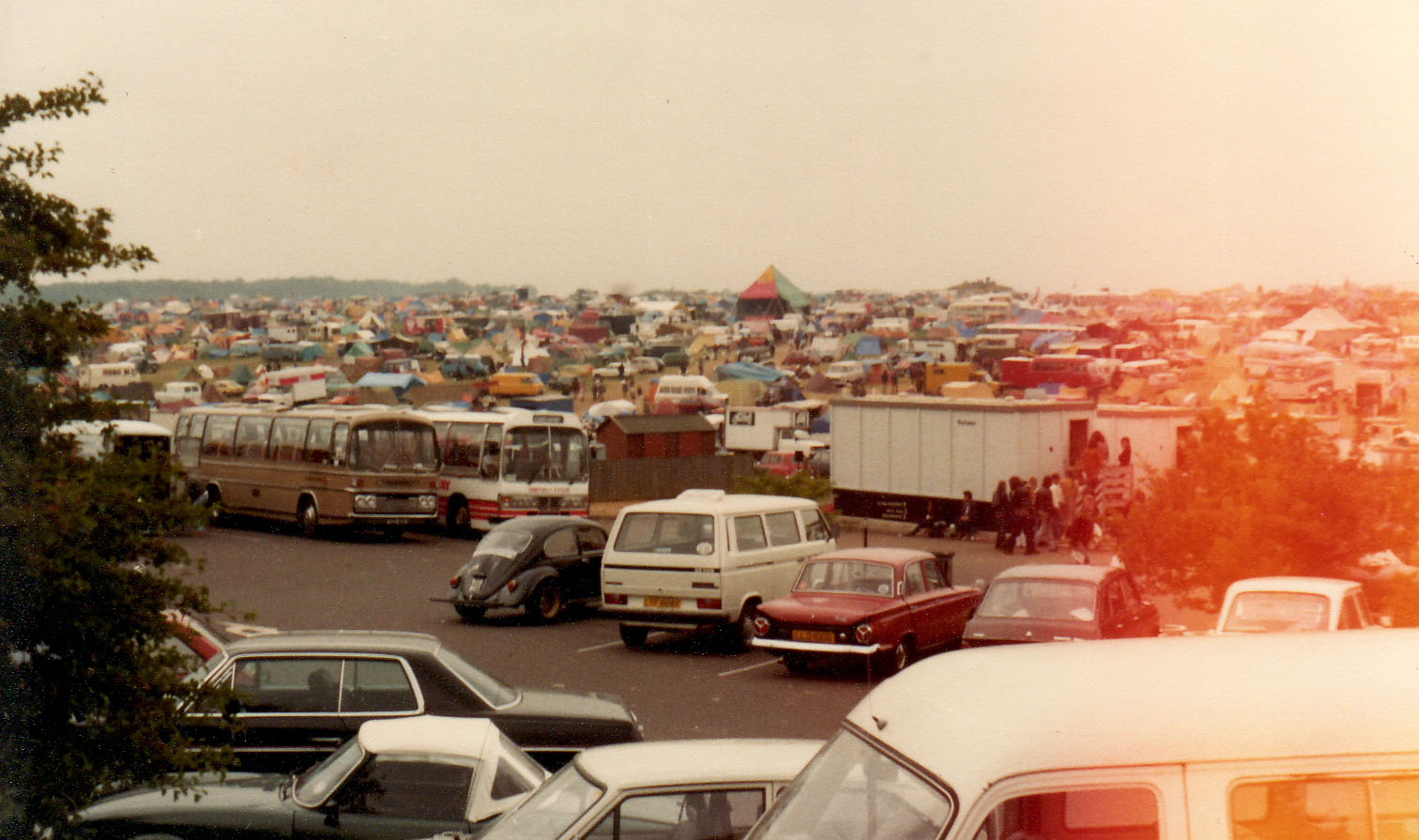
The Pyramid Stage at Stonehenge Festival circa 1983 on the afternoon before The Flying Pigs played.
The Flying Pigs worked less after Man reformed and Mickey moved to the West Country. From 1986/7 Mickey used to travel up and The Flying Pigs did mini tours of London playing at places like Walthamstow’s The Royal Standard, The Plough in Stockwell, The Half Moon in Herne Hill, The Cartoon in Croydon, The Mitre in Greenwich and occasional gigs in Hastings and on The South Coast.
At the Royal Standard we often played with Steve Marriott who we became great friends with. He used to watch Mickey play from the side of the stage. A lovely man and one of the best soul singers ever from the UK. The last time I saw him he was watching us and when we came off I said “Why didn’t you get up and do a number with us?”, “You never f*****g asked me did you?” was his reply.
In 1984 I formed a band with two guitarists Rick Mead and Phil Hunt and a bass player called Neil Clayton. They were called Hit n' Run and featured a lot of twin guitar. We used to play nearly every week in The Father Redcap at Camberwell Green and various other pubs, mostly in South London. The Father Redcap was run by an amazing guy called Tommy Hoolahan who had given The Flying Pigs their first gig at his pub The Cherry Tree in East Dulwich. All the bands and musicians in South London knew Tommy and he was loved by them all.
Phil Hunt was left handed but played upside down and had a beautiful unusual sound. We started to do regular excursions to a pub called Mr Cherry's in Hastings and St Leonards on the South Coast. The first time we got a forty seater coach and took a load of people with us. Afterwards we went in a smaller bus but the gig made a nice day out at the seaside. I didn't expect that ten years later I would be battling the local council to help save the bar's music license.
In 1990 I seperated from my long term partner Christine Dillon and moved down to Hastings and St Leonards hoping to concentrate on music. But first an unusual series of co-incidences led me on a roundabout trip through Canada and the USA where I visited Jimi Hendrix's resting place in Seattle on the 20th anniversary of his passing. The next day I met his Father Al Hendrix at his home. There are some photographs on the Photos page on this website.
On my return to Britain I opened the Light From Darkness Studios and later started seriously recording tracks for my own CD. Although there was a lot of curiosity from local musicians in the town I couldn't interest anybody in devoting time to my material so I ended up having to play everything myself. I got some unusual results laying down drums on the first track without any guide, I can tell you.
While I had the studio open I joined a band called The Ordinary Men who were essentially a couple of brothers from a Council Estate who wanted to be famous. Dave Francis wrote and sang the songs and played bass, his brother Andy on guitar. We weren't too bad but hardly anyone came to see us and repeat gigs were too rare.
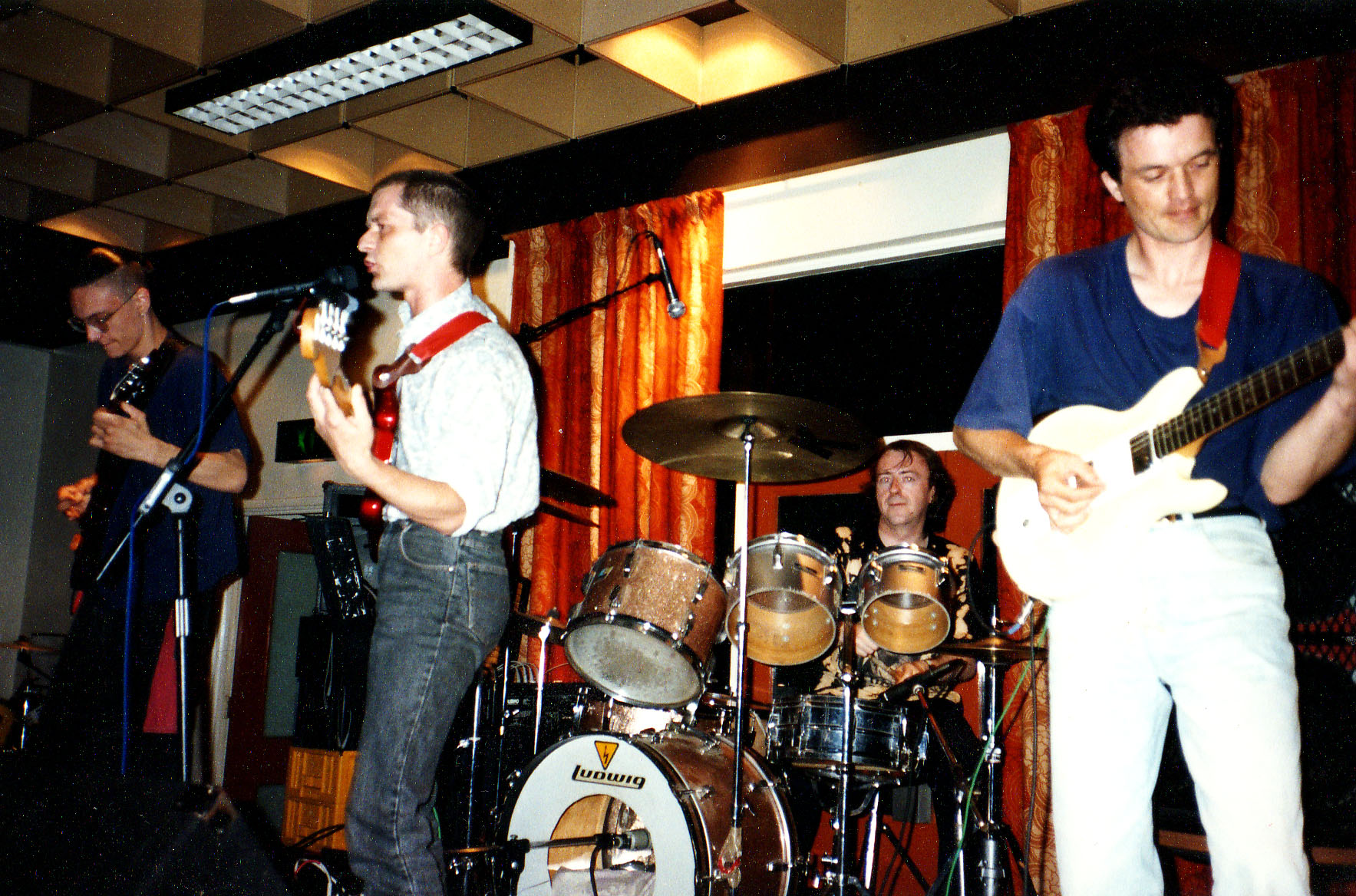
In the studio I was rehearsing a storming jazz fusion band with a talented bass player calle Pat Valentine and guitarist called Steve De Ville. Sadly we never got out to gig but I always thought that if we had, a few eyebrows might have been raised.

The Pullbacks outside famous Hell's Angels pub The Carlisle in Hastings where they were the house band
left to right - Joe Rytlewski, Phil Little, Martin Richter, Jez Gillett
Tired of no gigs I joined The Pullbacks who were playing at every pub in the town and all along the South Coast. This was a Rock Blues standard band led by Joe Rytlewski on lead guitar, vocals and deciding where on the stage he would stand that night. Martin Richter on bass (and that last joke) and Jez Gillet on keyboards completing the lineup. I wasn't very excited by the set of covers which remained almost the same year after year but at least there were regular gigs and spots at top events like the Hastings Beach Concert. We had some good nights and as a band we had a lot of laughs. Joe ran a professional outfit and we travelled. Martin Richter was a great help to me when I started up the Live Music Forum and he was elected to the committee.
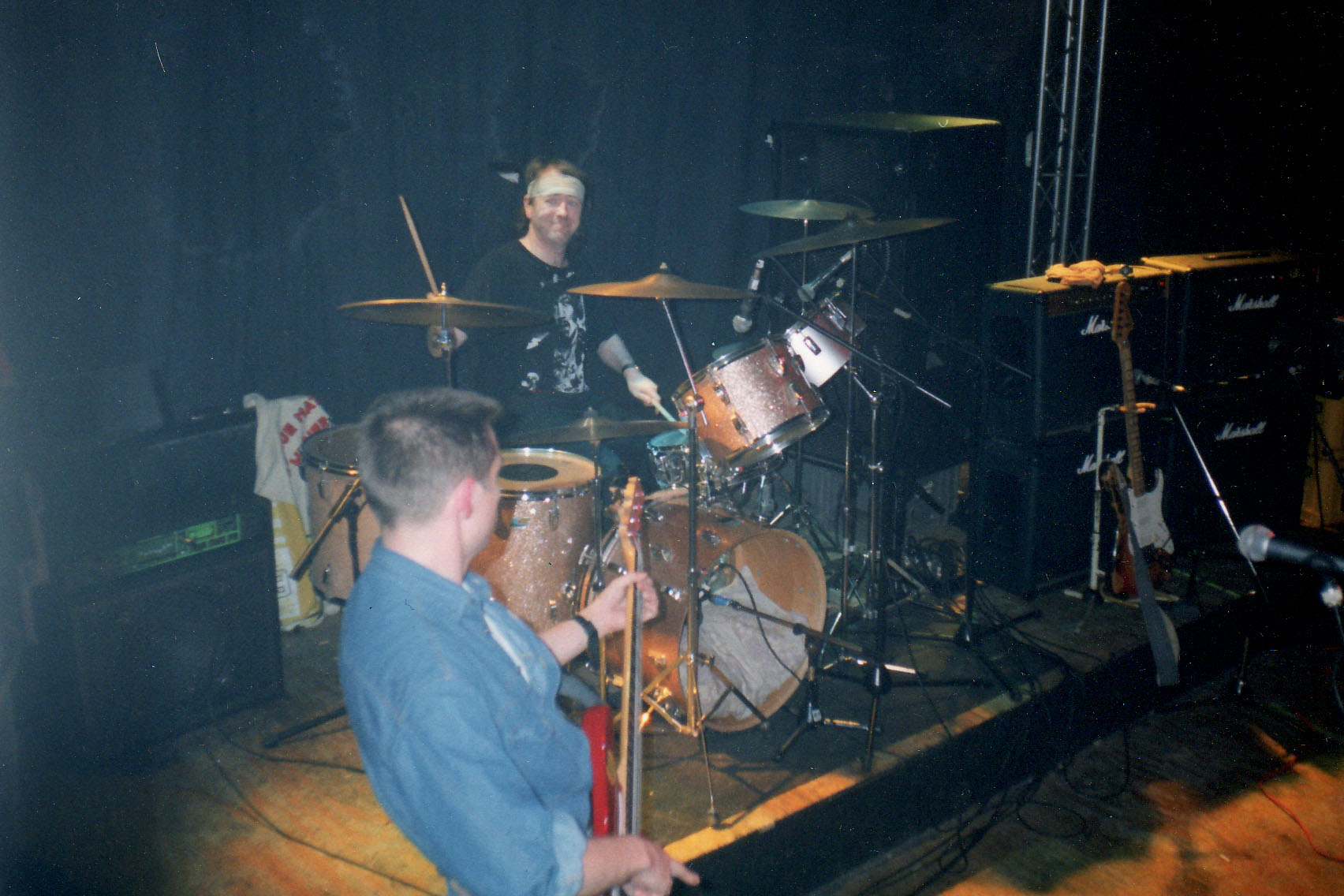
The Pullbacks at The Norbury in London
In 1992, during the last days of the Light From Darkness Studios a guy called Damian Hamill came to see me and said he was thinking of moving to the town.
Damian's idea was to start up a Samba Percussion band and he explained the nature of the Brazillian percussion ensemble which continues to gather new converts all over the country at a gathering pace. This was my introduction to the Bateria.
Damian told me that he had been a member of the first Samba percussion Bateria in Britain which is now the London School Of Samba. He had travelled in South America and spent three months in Brazil, where he had learned the difficult technique of playing the tamborim, a small hi pitched drum held in the nahd and played with a nylon rod. He had also helped found a group called Umbanda in Hemel Hempstead and he brought them down to play one weekend.
After he moved to Hastings, Damian had some Surdos constructed at a metal works and I arranged for us to rehearse in a Church Hall near to the, now closed, Light From Darkness Studios. Through doing some shows on trial FM radio stations I had come to know the people who were involved and was able to get them to send a roving reporter down to one of our rehearsals on a Sunny Sunday afternoon. Over the next few weeks we had loads of Women come down and join the band, Rachael, Rebecca, Jane, Jenny.
Although complete beginners, they were great and within a couple of weeks Damian had booked a spot in the Pig In Paradise, a pub nearby. A few more people joined and we played a few more places. Damian proposed the name of Bloco Liberdade.
We were then approached by a group who wanted to rescue an old Church built into the rock underneath Hastings Castle. St Mary In The Castle. despite the fact that the roof leaked when it rained and it was freezing all winter, we rehearsed there and assisted in establishing the notion of the venue as an Arts Centre.
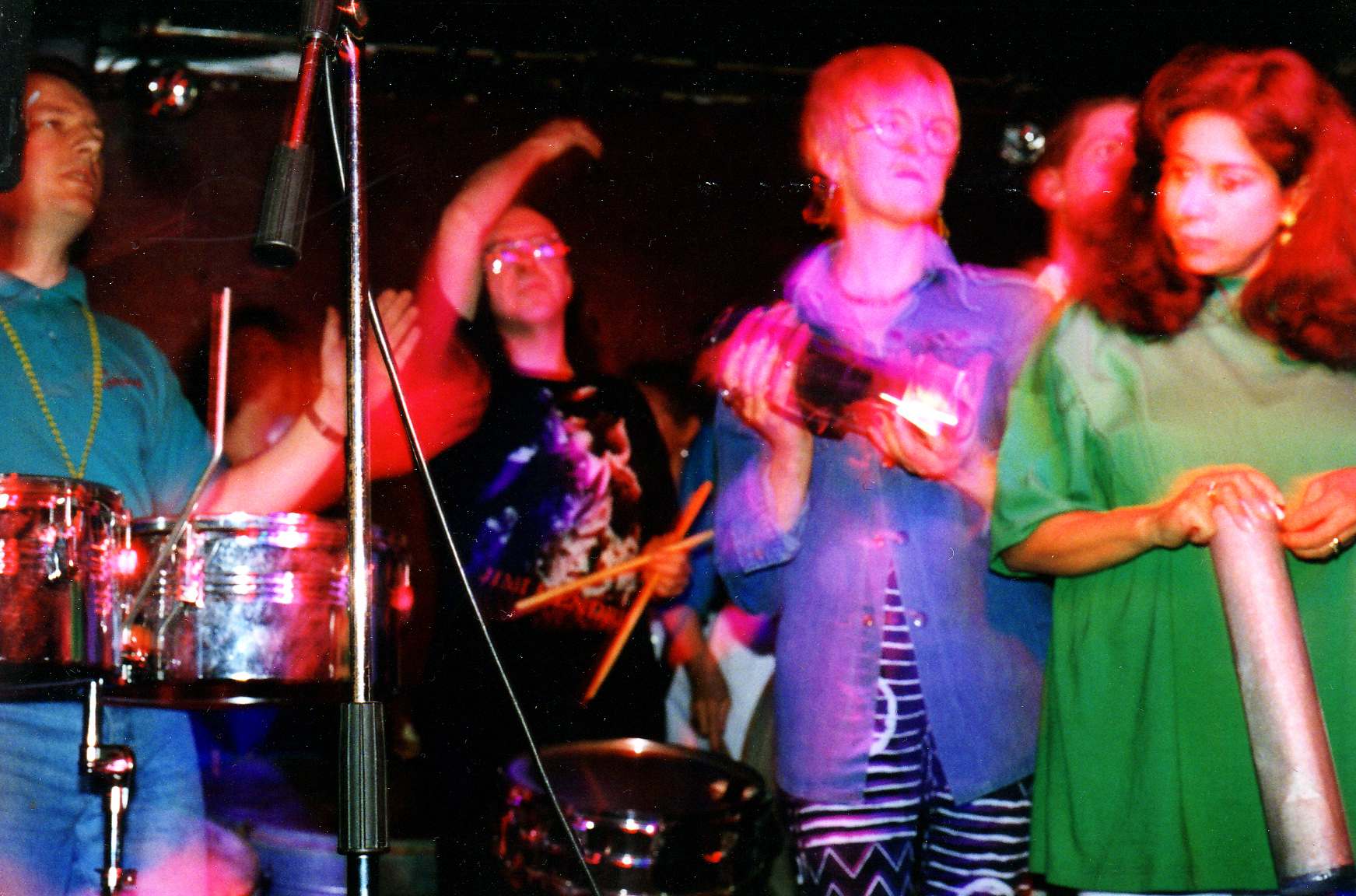
Bloco Liberdade went on to be invited to play at loads of fund raisers, Club Nights and outdoor events, including the centenary Bexhill Classic Car Rally and The Black Horse Festival. That was the last gig I did with them as I had decided to return to Canada to cast my fortune to the wind. Booked the ticket, sold everything off and gave up the flat. Then I bumped into my ex girlfriend Julia, now my wife and mother of Maya, at the Black Horse Festival after we finished playing.
I went to Canada for three months but my fate had already been sealed by the chance meeting at my last gig in th UK.
My first visit to Canada in 1990 led me, among other places, to a Pow Wow at a place called Cape Croker at a time of Crisis for Native Canadians. 3,000 troops surrounded 21 men women and children holed up in a Reservation health centre as a protest against plans to level an ancient burial ground and build a golf course. This was the OKA Crisis. Come back soon to see a picture of the golf course. Visit our Aboriginal page for more information on Aboriginal culture and The Drum.
On my first visit I met a Native Canadian artist, dancer and drummer called Russell Noganosh but three weeks isn't anywhere near long enough to get into anything properly so in 1994 I returned and stayed for three months, split between time in Toronto and on the road to various Reservations and Pow Wows.
I had the idea of trying to get in a band but, while Toronto is a breath of fresh air, it is similar to London in the fact that there too many bands and not enough gigs. One guy said to me in Grossman's Tavern one night "There are 10,000 bands in Toronto - don't come here". he was an Engish guitarist who had settled there years earlier. He made his living busking. There is a great busking scene in Toronto and before long I was plying my wares on Yonge St.
A substantial part of Toronto's live music scene is built on Jam Nights and I had a few goes at that and played in a Hemp Festival outside the Parliament Building, Toronto in a one off line up with a great guitarist called Neil Chapman and a wonderful bass player called Happy. While in Toronto I also checked out a new Samba group trying to start up, helped out at the Mariposa Festival and played with Leslie Spits, a popular Canadian group led by a Female singer and a guitarist, Laura Hubert and Pat Langner.
Russell Noganosh drove us up to the fourth Khanawake Pow Wow near Montreal. Khanawake being the community that suffered the OKA injustice. Russell introduced me to a Drum (ie four big guys who all play the same drum) called Rice Lake and I accompanied them in their van to the next Pow Wow. Vist the Aboriginal page for Audio.
I had a great time in Canada but I had already made my mind up to return to the UK so in the autumn of 1994 I ended up in Brighton living with Julia,who is now wife, and toward the end of 1995 we set off for India and Nepal for three months.
I didn't settle very well in Brighton. I played a few gigs with a Blues band called Slim Tim and The Quarterpounders, a Country band (definitely the last time) and a Latin/Reggae band, called Deep Mamboo, who played some nice stuff in a Tuesday residency at The Casablanca Club.
I found myself once again on the Hastings scene. Joe had changed the lineup and name of the band to Joe's Blues Band. Similar numbers by Hendrix , Clapton, Stevie Ray Vaughan and Gary Moore etc. I continued playing in Joe's Blues band while doing several other things.
When I returned to Hastings in 1996 there was no Samba band so I started a new one. My wife Julia played caixa and I mestred the band. Our friend Ann Hunter helped us start it off and did some neat artwork for the logo. We called it Sambalanco. Julia and I put a lot of effort into starting up and running Sambalanco.
I arranged sponsorship with one of the advertisers in a gig guide that I was involved with and we got instruments. Over a period of three years we played in front of about 250,000 people along the South Coast. In 1999 I had to stop doing it after a detached retina and other eye problems. Added to the fact that so much Samba Bateria was wrecking my hearing, something had to give.
As well as playing with Joe during the late nineties, I joined up with a hip blues chick called Mama Josie in 1997.
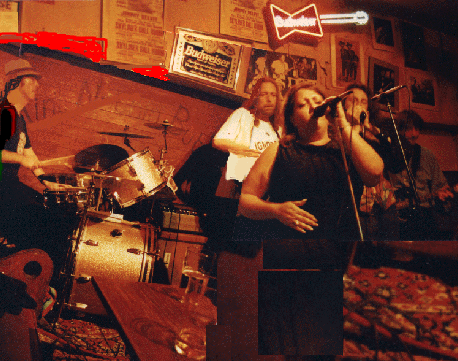 Mama Josie had a
truly
beautiful voice and it was a pleasure working with her. She could win
an audience over in half a verse every time. So nearly every night was
a good night. Josie's partner Alfie shared the front of house on
Harmonica and Simon Shaw played guitar. Most times Colin Gibson
(ex-Ginger baker's Airforce, Lee Perry, Snafu,The Movies) played Bass
guitar but was often depped by Terry Pack from Eastbourne. I was in
the
most fortunate position of having two of the very best bass players in
the nation to work with and it was a privilege. Simon Shaw is also a
great guitarist and capable of excelling in a variety of styles.
Mama Josie had a
truly
beautiful voice and it was a pleasure working with her. She could win
an audience over in half a verse every time. So nearly every night was
a good night. Josie's partner Alfie shared the front of house on
Harmonica and Simon Shaw played guitar. Most times Colin Gibson
(ex-Ginger baker's Airforce, Lee Perry, Snafu,The Movies) played Bass
guitar but was often depped by Terry Pack from Eastbourne. I was in
the
most fortunate position of having two of the very best bass players in
the nation to work with and it was a privilege. Simon Shaw is also a
great guitarist and capable of excelling in a variety of styles.
Mama Josie and The Alley Cats played straight up Blues numbers like Nobody Knows You, Georgia, Summertime, How'd You Learn To Shake It, Mojo, Further On and so on. The band played all over the South and were regulars at Harper's, Josie and Alfie's local. The photo was taken in The Ain't Nuthin But Blues Bar in London where Josie had them dancing on the tables."
MP3s
The Thrill Is Gone Mama Josie and The Alley Cats
Never Trust A Man Mama Josie and The Alley Cats
I think these were recorded on Simon Shaw's first gig with the band at The Old Kings Head in Tonbridge Wells, or similar.
Around this time I joined Mambo Jambo on Timbales. This was a 'Salsa' band run by Sally Greenhalgh on Flute. They had a great bass player Rob McCaig, who plays on my track Much Grecia, from It's About Time. Vincent Salsfaaz played Congas and Sally hired a variety of keyboard players, finding it difficult to get people who could play this very demanding style on Piano. One night we were lucky to have Neil Angilley who was mindblowingly good.
One afternoon I was at a pub in Hastings Old Town at the celebration of Kenny Craddock's fiftieth brthday and Nana Tseboe asked me if I was free to play that night with a new band he was starting up. Nana is one of the top African percussionists in the world but he wouldn't play any drums that night. These were his own new songs and he was singing and playing Mbira. He only had five songs and we had a quick run through before the gig with a lovely bass player who had come down from London.
The venue filled up and the first set went brilliantly. Then the bass plaer had to leave to get back to London. So we did the same songs again, this time with top Jazz bassist, Roger Carey. Only one person seemed to notice anything about the songs and remarked to me that one of the songs sounded a little familiar to something in the first set.
In 2001 we moved to Wales, where I met up with old band mate Mickey Jones again and we did a bit of playing and recording together but, sadly, Mickey passed away in March 2010. Before that sad day, one of the things we did was his son's, George Jones, debut CD. Mickey also played on a couple of my tracks, Yeah Man and Things I Left Behind. As I have said elsewhere on this site, Mickey Jones was the finest player and the best singer I ever worked with in my fifty years of playing and I know that Mick Hawksworth and a hundred others would say exactly the same.
After Mickey got ill I started getting into African drumming and began working with West Wales percussionist Steve Banning. With his Llanelli drum group we had some great times and played a number of events and Festivals in West Wales. In about 2008 we played at The Big Green Gathering Festival in Cheddar. Having not actually been to a Festival since the end of the seventies it was a bit of an eye opener for me and I came away with culture shock.
In March 2008 I did a couple of gigs as Littledrum, accompanied by Steve and Pauline Banning on percussion. In this we mixed the African rhythms with Trance tracks I had written on Ableton Live (modern DJ and Sequencing software). This produced some interesting results at The Bay Hotel, Llanelli, with audience members on the chairs, raving, and people frantically texting their friends to get down there.
In 2010 my family re-located back to Hastings and I formed The Rhythm Section with Simon Shaw and Mick Bolton. Originally I was aiming for the sound of early Santana (first two albums). Our set contains a few Santana numbers but is gradually consisting more of original songs, mostly written and sung by rhythm guitarist, Leo Baroni. About a year after we started we were joined by Barry Jones on Bass guitar and I have to say that Barry is now my all time favourite bass player to work with. You don't often see him and that is because he is sat next to my hi hat.
The Rhythm Section is, without doubt, the finest band I have been in since playing with Mickey Jones and Mick Hawksworth in The Flying Pigs throughout the 1980's. Visit www.therhythmsection.org.uk to find out more about them.
In 2016 I released two albums on CD Baby and in July I staged a 45th anniversary Nothing Ever Happens Arts Gentle Giant gig at The Studio in Widnes, featuring Matt McGurty and The Mnemonics, Tony and Vince Kenna, Schunge, Rob Richardson, Clive Little and Julian, with Barry Jones and myself as the House Rhythm Serction.
Currently I am recording a couple of Blues tunes and contributing to recording projects by Barry Jones and Leo Baroni, both who play in The Rhythm Section.
Thanks for visitng the website and taking the time to read this.
Love and Peace
Phil